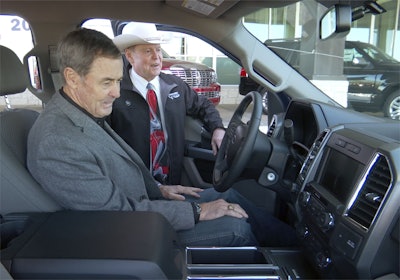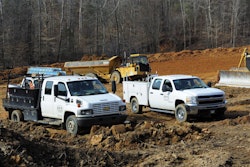
Lease or Buy: New vehicle Purchase Options
By Robin Walton/Editorial Services West
[Originally published 10/5/2011]
If you are considering purchasing a new pickup for your business, you will likely find yourself at a fork in the road: Lease or buy?
The question of whether to lease or buy has been debated for years, and the answer from experts on which option is best seems to be, “It depends.” And truly it does depend on your specific circumstances and your future plans, vehicle-wise.
Therefore, it’s worth taking some time to consider various factors so you can make the best decision before you acquire a new vehicle.
Show me the money
With the economic downturn, many companies are running on a tight cash budget. How much cash you have up front for a vehicle – as well as how much you have available for monthly payments – factors into the decision to lease or buy.
If you are concerned with short-term cash demands, leasing generally will require less cash up front and you will have lower monthly payments.
If you buy a pickup, you will need to have the cash for a down payment and sales tax on the full price of the vehicle. The monthly payments will include principal and interest on the full value of the car. This means your payments to purchase the pickup will probably be higher than lease payments.
If you lease the pickup, you are in essence paying for the part of the vehicle you’ll be using in a two- to three-year period, sales tax on the payments (rather than the full value) and a finance charge.
You’ll need to pay some fees and a refundable security deposit up front. However, you can often negotiate on the fees so the cash you need up front is usually significantly less than coming up with a down payment for a pickup. Your lease payments will also probably be lower than payments on a loan.
The basic question as far as money matters are concerned is what is your cash situation right now? If it’s tight and you need a new vehicle, leasing may be your best option.
Long-term plans
If available cash isn’t an issue for you, then you should look at your long-term plans for the vehicle. Are you planning on keeping it for 10 years or do you expect to only drive it for two to three years?
If you plan to keep the vehicle for the long-term, then most likely you will save money by purchasing your pickup. Lease-to-buy plans are nearly always more expensive than buying the vehicle outright.
However, if you are a savvy money manager, you could lease, requiring less money up front, enabling you to take the money you save and invest it in mutual funds or stocks that will give you a return on that money.
Depending on what you invest in and market conditions, you could come out ahead with this scenario.
But the reality is, most people end up taking the money saved and spend it elsewhere. Only you can determine if this is a feasible option in your situation.
The devil in the details
Unfortunately, deciding whether to lease or buy involves a whole lot more than just how much cash you have right now and how long you plan to keep the vehicle. Here are some other things to consider in your decision making process.
Taxes – If you are deducting a portion of your pickup’s depreciation from your taxes, you will generally be able to deduct substantially more if you lease. Interest paid on a loan to purchase a vehicle is not deductible. But when you lease, you can deduct depreciation as well as the implicit financing costs. You need to check with your tax accountant regarding specific IRS rules.
Flexibility – You can end up losing the money you saved in the short term if you have to terminate your lease before the contract is up. When you cancel your lease early you typically owe all remaining payments minus allowances for the depreciation that hasn’t happened yet. So if you foresee any big changes on the horizon that would affect your ability to stick with your lease, you should probably not sign on that dotted line.
Gap coverage – Many leases include gap coverage – insurance that covers the difference between the vehicle’s value and the lease or loan balance if the car is stolen or totaled. Most car loans do not include this type of coverage. Gap insurance provides protection if you end up “upside down” – where you owe more on your loan or lease than your car is actually worth.
Annual mileage – Leases are usually based on 15,000 miles annually. If you drive over that amount, you have to pay extra. If you drive significantly under that amount, you will end up paying for depreciation that you are not actually causing. Look at your mileage history to ensure you fall into the appropriate mileage range before leasing.
Shop for a deal – If you are purchasing your vehicle, you are likely familiar with checking different financial institutions and even online for the best interest rate. If you are considering a lease, you may want to look into taking over someone else’s lease. There are folks who got into some great lease deals who are now forced to get out because they’ve been hit hard by the economic downturn.
Websites such as swapalease.com specialize in matching up those who want to “exit their lease” with those who want to find a lease.
There is no quick and easy answer as to whether leasing or buying is better. It just depends! But if you evaluate factors such as cash availability and future plans, you’ll have a good idea which fork in the road is right for you.
 About the author: Robin Walton has been a licensed contractor for more than 20 years and has 16 years of financial accounting and systems experience. With a degree in accounting/economics and hands-on construction experience, she understands the day-to-day business of contractors and landscapers.
About the author: Robin Walton has been a licensed contractor for more than 20 years and has 16 years of financial accounting and systems experience. With a degree in accounting/economics and hands-on construction experience, she understands the day-to-day business of contractors and landscapers.








